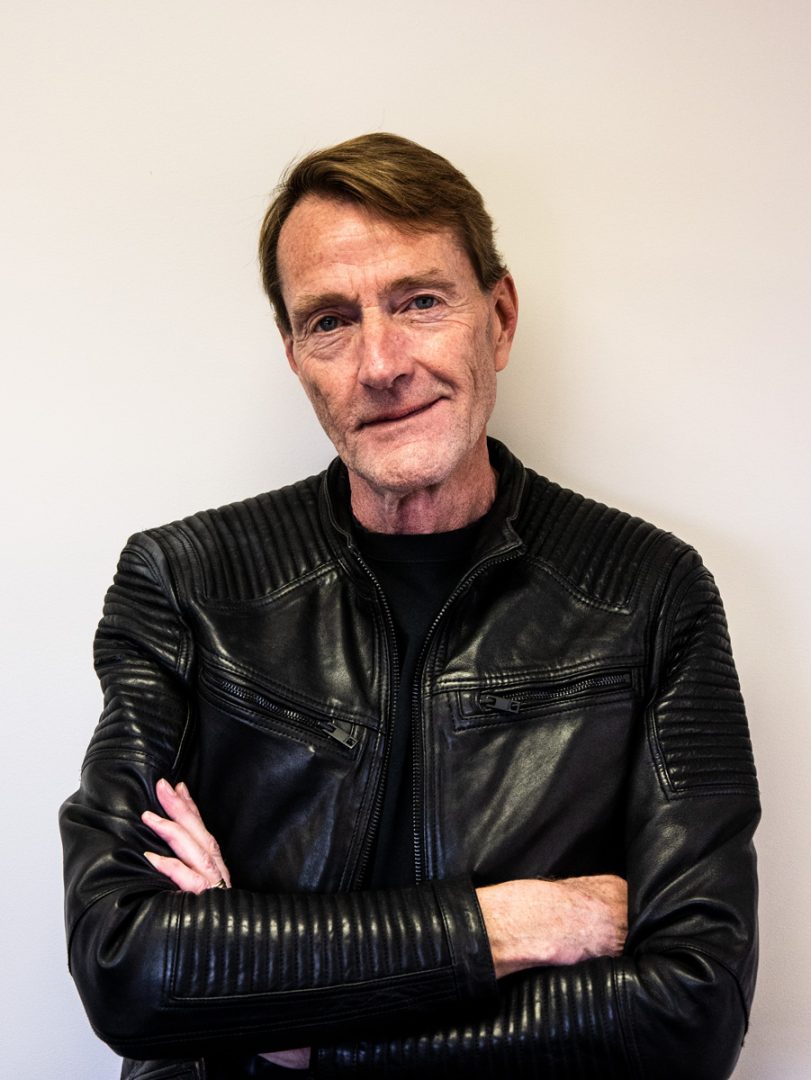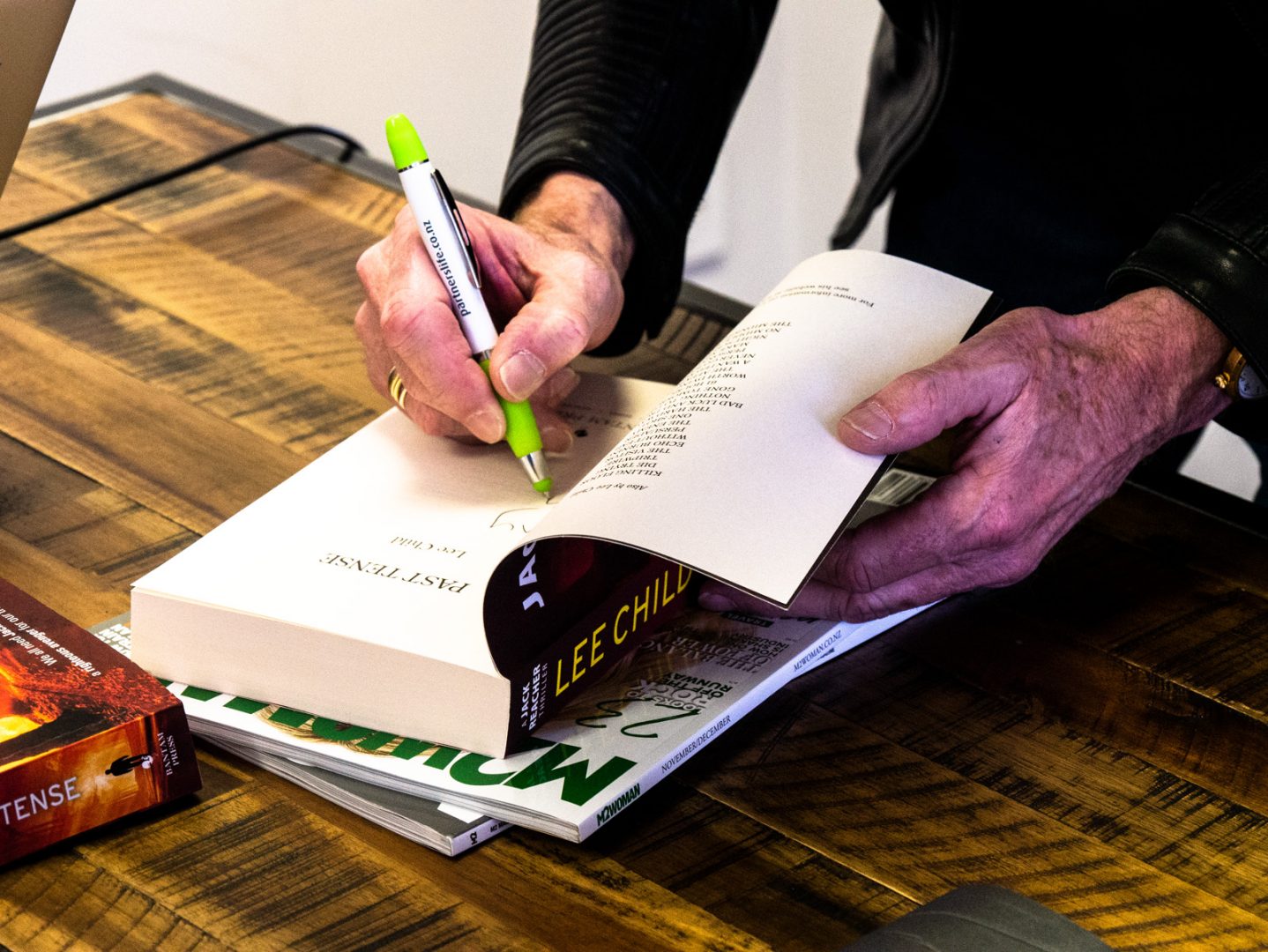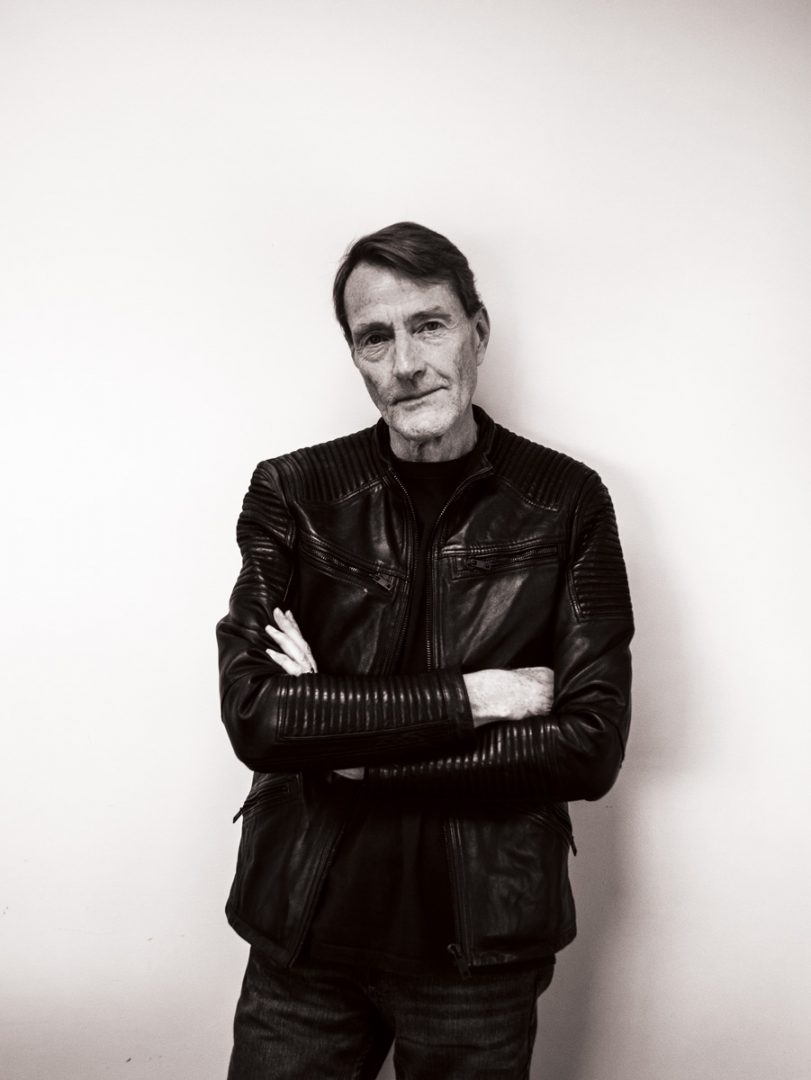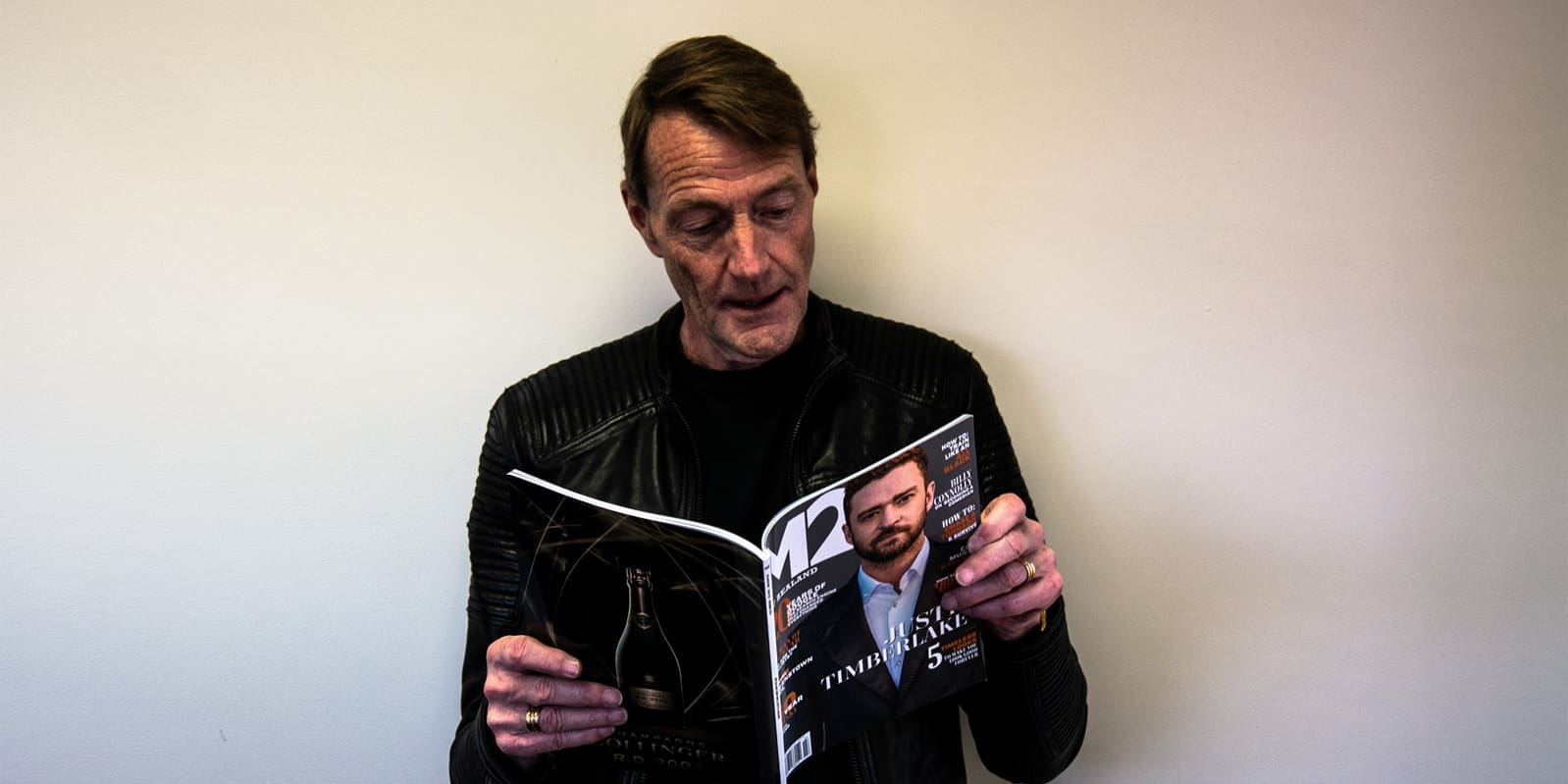Lee Child
I was so pleased when I learnt that Lee Child (Jim Grant) had been made redundant back in the mid 1990’s from his television programming job. Because I really didn’t want ask silly questions like ‘what are your influences?’ and ‘who do you read?’ After the big blow of being made redundant, Grant took a year out to clear his head and with the help of his a supportive wife, launched his writing career.
They agreed to give it a year. If it worked, fantastic. If it failed, he’d get back into the workforce with no regrets. Twenty one years and twenty three novels later, it’d be fair to say it has worked out fantastically well. For those not familiar with the talented Mr Grant, his main character is Jack Reacher; ex-Military Police, who also had an abrupt end to his career in the mid 90’s. Since then, he roams the USA walking into adventures. Reacher is tall, tough and logical. He has his quirks; he buys new clothes, wears them for 3 days and then throws them away and buys new ones. He has no fixed abode and just wanders from one place to the next, in the “outback” of America.
Two of Grants novels have been turned into films, starring Tom Cruise as Reacher. 64-year-old Grant was in Auckland for a promotional tour for his new Reacher novel, Past Tense. Once all the M2 staff had mobbed him for autographs, I got down to business.
The turning point in your life was when you got made redundant, did that have an impact on you?
It did. In a way it was a really bad thing. Millions of men and women at that stage were losing their job and it is dispiriting and discouraging because you feel reluctant to start at the bottom of something else. You feel reluctant to even start interviewing for things and it’s a bit of a crisis, a crisis of morale.
I’m from that generation that expected to work at one place for my career. I know that’s changed now, but old guys like me imagined we’d work at one place. We’d retire, get the gold watch and that was it. That changed halfway through and that was disorienting and basically very negative, except that, if you take a deep breath and step back one pace, you think ‘What are the positives?’
You’re still young enough, you’re halfway through your working life. You’ve done the first half, you’ve got skills, you’ve got disciplines, you’re not the person you were when you were younger.
Maybe you can exploit that, maybe you can move forward from that. And it probably is the last chance you can make a change in your life.
So I did definitely emphasise the positives and, looking back at it now I realise that it was a psychological game I played with myself. I didn’t allow myself to worry. I wrote that first book and I just assumed it would be bought and I assumed there would be more and of course, looking back at it now, that’s ridiculous.
The idea that you’re going to start a successful series that’s still running 23 books later, is like saying I’m going to win the lottery and get hit by lightning twice on the same day – it just doesn’t happen. But I stayed positive and I guess being positive about it, made it happen.
It sounds like your wife was very supportive as well?
From her point of view, it was obviously a big worry because we had all the usual stuff; mortgage and our daughter’s education to think about. But she was brave about it, she said take a year and see what happens. She was sort of biting her lip a little bit but she was supportive.
Had you been dabbling in writing before then?
Never, I had not. Literally, the first line of Killing Floor (1997) is the first fiction I ever wrote. But I felt that, in a way again, that was a positive because I was not hung up on the image of being a writer.
You get a lot of people who, they just want to be a writer; what does that mean exactly? They’re obsessed, they want to be Albert Camus, they want to buy the black polo neck shirt and be cool and all of that. But in motion television, the first thing you learn is it’s not all about you, it is about the audience and I think all real media people understand that; it’s about the audience, the audience first, second and third. It’s about the transaction of entertainment.
So for me, I came into writing as an entertainer. That was my goal, in exactly the same way that a TV show makes people happy, it fills their evening with fun and enjoyment. That’s what I wanted to do and the media was less important to me than the end result. I backed into writing rather than aimed for it and it works exactly like I thought it would. It’s like a movie or a TV show, we’re all swimming in the same river, effectively.
And we’re all influenced, one thing influences another thing; that struck me a lot. Writing is influenced by television, television is influenced by writing. Everything goes round and round.
Generally speaking, in terms of speeding up, I love looking back at various milestones along the way. One of my favourite comedy shows on television was M*A*S*H. Great show, right? You look back at M*A*S*H and you think of it as a quick fire, half-hour comedy. Get the DVD of series one, it is slow as molasses by modern standards. Same thing really with books.
Way back in the day, I remember a book called Captain Corelli’s Mandolin which was a good book, but the buzz of that book was you’ve got to give it 50 pages and then you get into it. And that’s ludicrous now, the idea that anybody would give a book 50 pages; they won’t give it 50 words. You’ve got to hook them right there in the first line, everything speeds up.
Then we’ve got James Patterson and Dan Brown who invented the idea of really short chapters, maybe 100 or 200 chapters in a book; which again, is a speed thing. It’s also a satisfaction thing from the reader’s point of view; they think they are making progress and that is gratifying to the reader. So everything changes everything else. Book writing does not stand alone, it is one strand of popular culture.
How do you sit down and write 400 pages, it must be a hard?
It is, but fortunately, I can do it. So it’s just luck, you can either do it or you can’t. The place that you really, really see it is in dialogue which is a really subtle thing because it is just plain words, strung together. But you know whether it’s working or not and you read somebody else’s book that is not very good and it’s clunky, it’s not right. You read a book that’s good and the dialogue works brilliantly and you can’t really see the difference, you can’t explain the difference, but it’s there.
So it was just a lucky coincidence, I could write and I’m not falsely modest about that; I’m a good slick writer and can get the words down on the page of pace and propulsion and economy. But beyond that, I think my success is that I’m a completely ordinary person who is able to write. So what’s in my head, is in millions of other people’s head because I’m not distinctive in any way, I’m just a member of the public. So I’m able to express myself and millions of other people feel the same way about things. 
Do you map out a plan?
Never, I never plan for the novel. I absolutely rebel against that because I feel, you plan out a novel lots of people have a very detailed outline, some people have a fairly vague outline but there is always an outline of some kind.
I feel for me, that would put me in a straight jacket because the best parts of all of my books are spontaneous and accidental. I’ll just be writing a scene and something in it will make me just be like ‘Yeah, this is great!’ and off we go. If I had an outline, I think I would be inhibited by going in that direction. I would plod through the plan and the book would be stiff and a bit boring by comparison.
So you’re not working toward an end?
No, sometimes I have an image in mind or even a line of dialogue in mind that I know is going to come at some point and that is a slight beacon but usually I just make it up and see what happens; which is like real life, we don’t know what is going to happen. We really have no idea what’s going to happen this afternoon or tomorrow and so I think a book should be the same way.
Have you started Blue Moon your 24th book due for release next year?
Yes, I’m about a third of the way through and I know what’s happened so far because I’ve written it, but I have no idea what’s going to happen next and I don’t know where it’s going to end up.
Do you use a computer or do you write the old fashioned way?
I use a computer now but the first one I did with a pencil and paper because I didn’t have a computer at that time and I wanted to emphasise to myself that this is not a hobby. I’m a terrible hobbyist. When my kid was young, I bought a camera and lenses and all that sort of stuff. I buy the gear and I wanted to emphasise to myself this is not like that, this is a profession, it’s a job, I’ve got to earn it.
So I did the first one in pencil and then borrowed a laptop and typed it out to submit and then when that book sold, then I bought a computer. So now I do it straight into a computer, simply because the whole world is digital now; you never see any paper until the book actually comes out.
What’s a typical day for you?
I work at home, my back bedroom is my office and I have a desk and a desktop computer and things piled on top of it, stacks of paper and letters and this and that. So a typical day for me, I don’t like working in the morning.
Having worked in live television, it was a roster system where I was sometimes starting really early, sometimes finishing really late, sometimes working all night. I thought the one luxury I’ll allow myself was to work when I want to, which for me is afternoon and evening. I get up late, I just doss about and then start after lunch and carry on and usually finish around 8 o’clock. Then towards the end of the book when I’m really excited about it, I’ll maybe go back to it at midnight and do a couple more hours.
I like working at night. I like it when the city is quiet, everybody else is asleep, I’m secretly there working. They say New York is the city that never sleeps but it does certainly takes a nap at about 5 in the morning.
Do you go on roadtrips to research all of the places that Jack Reacher goes to?
Only sort of backwards and accidentally. I’ll go on roadtrips for the fun of it or only because I’ve got to go somewhere or do something and then you see stuff along the way. I’m not consciously researching or anything but it sticks in your mind and then it could be five years later when you need a particular feel for a scene or a book and I think back and I think that place would do it.
It’s quite interesting with each book, as Reacher moves around America, they’re almost like the Wild West still some of these places, the East and West Coast are in a different planet almost.
Yeah, absolutely. It’s shaped like a molar or a tooth, really. You’ve got the West Coast, then you’ve got Chicago and then you’ve got the East Coast. And the rest of it is empty, uninhabited, full of vast distances and secrets and little towns that have been bypassed and forgotten. It’s a fascinating contrast. People think of America, they know the image; it’s New York and all that kind of stuff but then also there’s lonely towns, tumbleweed blowing through the streets. Those exist.
When I told some of the people in the office about Reacher’s lifestyle of wearing clothes for only two or three days then throw them away and just walking around with a toothbrush, they thought that wasn’t very environmentally-friendly.
Well, I would argue that it is. Because if you wash your clothes, you’ve got to have a washing machine and a dryer in your basement which means you’ve got to have a house and you generate and consume electricity and all that kind of stuff. I think it’s reasonably economically environmentally friendly.
I suppose what I should have him do is donate the clothes to Goodwill or something so a poor person can wear them, which is what I do. I do very little laundry, buy really cheap clothes; this is like a $10 tee shirt, $20 pair of jeans. I took a full suitcase with me when I came out on the road and it’s getting emptier and emptier because I’m just dumping them as I go along.
Is it your first trip to New Zealand?
No, it’s my fourth trip. I love New Zealand, it’s interesting to me for it’s isolation. When I come down here, you get that sense that it’s far from anywhere which I think absolutely defines the people. It was interesting to me how early Kiwi’s got into the internet as if there was a need to connect which I can completely understand.
There’s a sort of restlessness about New Zealanders, you meet them all over the world. In fact, I read a statistic that said the population is about 5 million and at anyone time, there is a million Kiwis somewhere else. The first house we bought in the States, we bought off a New Zealand couple who had been there for 10 years, then were moving on to somewhere else.
I think it’s a symptom of the restlessness that the isolation somehow creates. It makes for a dynamic society. And then of course, the attraction of staying here physically, it’s so beautiful.
Physically, it’s a fantasy, really. It’s as if somebody’s designed a country. You say to a bunch of set designers, ’Design a country,’ and they come over here to New Zealand.
Why did you choose to move to New York?
There was something appealing about it all my life; literally since I was four years old. I got a book out of the kid’s section of the library that had a picture of it that was unexplainable, really. I just saw that picture of it and thought ‘I should be there.’ Not that I wanted to be there but that I should be, how come I’m not? I’ve been mixed up at birth then brought to the wrong country.
So I always wanted to do it, I love New York simply because it makes no concession at all to the human scale. It is what it is and you’ve got to deal with it. It’s a hard place to live but it is uniquely energetic and everything is there, and if it’s not there, it’ll be there next week. Anything you want to see, any movie, any painting you want to see; if it’s not there right now, it’ll be passing through pretty soon.
It’s very compressed which is why I prefer it to London. London is a fine city. Sydney has got beautiful city views, San Francisco does, but they sprawl. The problem with that is you’re in London and there’s an attraction on but it’s eight miles away, it’s going to take you an hour and a half to get there so you really don’t bother. Whereas in New York, anything that’s less than 20 blocks, I’ll walk and the subway is really quick and literally you can be anywhere within 10 or 15 minutes, which is an amazing advantage for any huge city.
Why Tom Cruise for the character Jack Reacher?
We did that deal 13 years ago back in 2005 and the series was big then but not as big as it is now, so I had correspondingly less leverage over the decision. Not that I was unhappy about it, Cruise is a lovely guy, terrific actor. I enjoyed working with him, I like what he did in both movies but the readers were never happy with him, they never accepted him as Reacher.
Ultimately, obviously my loyalty is to the readers and so we’re making a change. My contract says that after two movies, I have a veto as to whether there will be anymore. I’ve decided no, there won’t be and we’re going to do binge-watching television with a completely different actor. So it’s a reboot of the whole proposition, really. The readers ought to be very, very happy about it and I think they are.
Any actors in the mind that you think would make a perfect Reacher?
I would like to find the unknown guy, the model that was around sixty years ago that was around with Sean Connery and James Bond. Sean Connery was a completely unknown person and then became literally James Bond. I would like the same situation now and I think you can do that on television.
That’s the blessing of television, it’s not star-driven in the same way that feature films are. So we probably can find the exactly right guy that brings no baggage, no previous history and should be really exciting. Reacher’s got a heart of gold that people respond to and so we’ve got to find a person that can communicate that. That he steps in a room, initially you are a little bit worried and intimidated but then you realise something about him. If you’re a good person, he’ll be on your side.
So that is quite an acting challenge because you’ve got to do it silently without much movement; Reacher is not a frantic or intense person. You’ve got to find somebody who can do that with one glance. Actors are very skilled and so hopefully we will find the guy.
So it’s a full circle back to TV then?
Yeah, which I never expected. I left television thinking ‘I’m done with you, I’m never going back there.’ But television has changed completely in that streaming television was never heard of before, now it’s a thing. People say that it’s novelistic which I think is a bit lazy, all they’re really saying is that it takes you 10 or 12 hours to watch a season, similar to reading a book.
I think the narrative techniques are completely different and everything is dissimilar but it is the place to go now; that’s where the quality is. Certainly that is where the budget is, they spend a lot of money per hour and therefore you get a really great looking show.
You’ve been through a redundancy which I would say was a blessing for you. Going into 2019, what advice do you have for people out there going through something similar?
Anybody right now, who has been thrown out of work, I understand how it feels, I’ve been there. It’s not a great feeling but do what I did, which is take a deep breath, step back and look at what are your core skills.
Your surface skills are useless to you because they’re related to the job you’ve just been kicked out of. But step back, what is the core of it? Find some other way to use them because you’ve earned those skills over 20 long hard years; find a way of using them.

